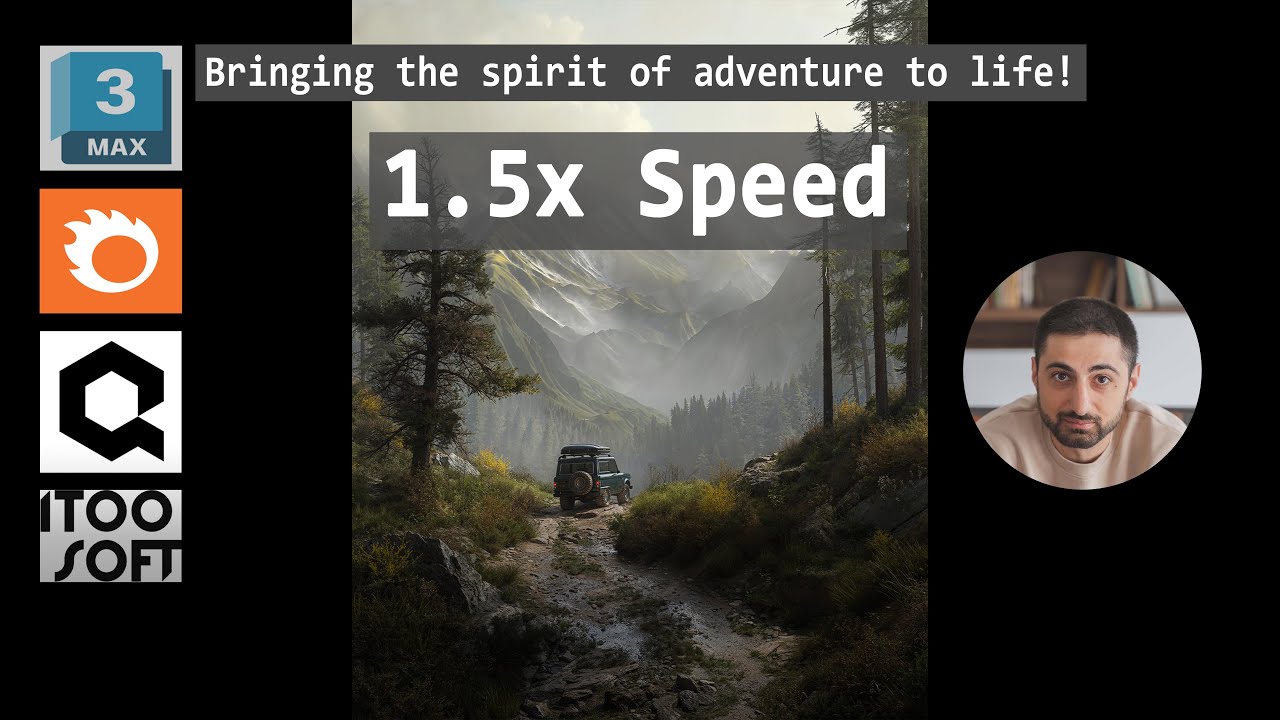The post ChatGPT-4o Update: Why Every 3D Artist and Architect Should Pay Attention appeared first on Ejezeta.
]]>
OF3D Academy recently shared a video explaining how ChatGPT-4o, OpenAI’s newest AI model, is changing the way architects and 3D designers work. It’s a powerful tool that’s fast, visual, and easy to use.
What Makes ChatGPT-4o Special?
ChatGPT-4o is not just for text. It also understands and creates images, audio, and video in one chat. That makes it perfect for creative tasks that combine visuals and conversation.
With it, you can:
- Turn a screenshot into a clean 3D render
- Refine designs by chatting with the AI
- Handle detailed prompts faster
- Save time in every part of the workflow
The best part is how it keeps context. It remembers your edits and builds on them as you go.
How Designers Use It in Real Life
In the video, OF3D Academy shows real examples. A simple SketchUp model becomes a polished image. A chair in a room is swapped without losing the light or the materials.
The AI also lets you shift the lighting in a scene—from day to golden hour. It even creates technical sketches from product photos. This keeps your ideas flowing while saving time and effort.
Will AI Replace Designers?
Not likely. As OF3D Academy explains:
“It’s not AI that will take your job. It’s the professionals using AI who will.”
This shift rewards those who are open to change. The more you use tools like ChatGPT-4o, the more efficient and creative your work will be.
Learn More with OF3DA
Want to learn how to use these tools in real projects? OF3DA is OF3D Academy’s hands-on course. It teaches you how to use AI in your architectural workflows—step by step.
Final Thoughts
ChatGPT-4o is more than an AI assistant—it’s a design partner. You can use it to brainstorm ideas, edit images, improve renders, and much more.
If you’re in architecture or 3D, now is the time to try it.
The post ChatGPT-4o Update: Why Every 3D Artist and Architect Should Pay Attention appeared first on Ejezeta.
]]>The post AI-Generated Resources for 3D Rendering: Boost Your Visuals appeared first on Ejezeta.
]]>
In this RenderRam video, you’ll explore simple ways to make your 3D renders look more realistic using AI-generated resources for 3D rendering. These resources help you add photorealistic touches—without needing to use AI tools directly.
AI-generated resources for 3D rendering are compatible with major 3D software like Blender, 3ds Max, and Cinema 4D. As a result, they help you get better results faster, regardless of your skill level.
Whether you’re just starting out or already experienced, these practical ideas will help you bring more depth and realism to your projects. In other words, they’re perfect for anyone looking to improve their workflow using AI-generated resources for 3D rendering.
AI-generated textures, for example, can easily replace flat materials and provide depth and variation with minimal effort. Background elements like skies or landscapes, created with AI tools, can also add realism to your scenes. You can even use AI-generated reference images to inspire your lighting setups and camera framing.
The beauty of these tools is that they don’t require direct integration—you can simply use the outputs they provide and apply them creatively in your workflow. This means artists who prefer traditional software can still take advantage of the AI boom in a way that fits their process.
- Read more on 3D techniques here: Blender.org
- Learn how to integrate AI workflows: NVIDIA Omniverse
- Explore related AI tools for artists: RunwayML
- More tutorials and tips: Our AI-enhanced rendering guide
Start creating more realistic 3D renders today with AI-generated tools that fit perfectly into your pipeline!
You can check out more tutorials by RenderRam here!
The post AI-Generated Resources for 3D Rendering: Boost Your Visuals appeared first on Ejezeta.
]]>The post Realistic Water Shader with Caustics in 3ds Max and Corona Renderer appeared first on Ejezeta.
]]>
In this tutorial by Estudio MOT, you will learn how to create a realistic water shader in 3ds Max. You will also learn how to add caustics and volume materials using Corona Renderer.
The post Realistic Water Shader with Caustics in 3ds Max and Corona Renderer appeared first on Ejezeta.
]]>The post 4 Hidden Features in 3ds Max Revealed by Vjekoslav Kiraly appeared first on Ejezeta.
]]>
In Volume 17 of “Known Unknown Depths of 3ds Max,” expert Vjekoslav Kiraly from RenderRam shares four helpful, hidden tools in 3ds Max.
First, he covers “Ignore Extents.” This feature makes managing complex scenes simpler because it lets you ignore certain objects.
Next, he introduces “Ribbon – Fill.” With this tool, you can quickly fill gaps in your geometry. As a result, your modeling becomes faster and easier.
Then, Vjekoslav explains “Spline Quad Cap,” a useful feature for creating clean caps on spline shapes. This improves your models and their topology.
Finally, he discusses the “Spline Overlap” tool. This tool helps you fix overlapping spline segments easily, so your models become precise and clean.
Overall, this tutorial from RenderRam is perfect if you want simple ways to improve your architectural visualization workflow in 3ds Max.
The post 4 Hidden Features in 3ds Max Revealed by Vjekoslav Kiraly appeared first on Ejezeta.
]]>The post A new AI tool that creates 3D models in seconds! appeared first on Ejezeta.
]]>
In his latest video, Vjeko from RenderRam showcases a new AI tool called Rodin Hyper3D, a platform that transforms 2D images and text into high-quality 3D models with ease.
The post A new AI tool that creates 3D models in seconds! appeared first on Ejezeta.
]]>The post Bringing the spirit of adventure to life! appeared first on Ejezeta.
]]>
Georgian archviz artist Michael Khachaturyan, from Michael Archviz Studio, presents the Making Of for his latest project: Bringing the spirit of adventure to life!
Find out how he combined 3ds Max, Corona Renderer, Megascans and Forest Pack to make this project a reality.
The post Bringing the spirit of adventure to life! appeared first on Ejezeta.
]]>The post Free 3D Models DCLXV | Aslak Chair appeared first on Ejezeta.
]]>
Meshroom is giving away this 3D model of the Aslak Chair, designed by Ilmari Tapiovaara in 1946, and manufactured by Artek.
This asset is available in OBJ, FBX and 3ds Max native format, compatible with both V-Ray and Corona Renderer.
You can get the files here.
The post Free 3D Models DCLXV | Aslak Chair appeared first on Ejezeta.
]]>The post Back To Basics: Introduction To 3ds Max | Part 6 appeared first on Ejezeta.
]]>
Want to speed up your 3ds Max modeling workflow? Vjeko from RenderRam is here to help with a deep dive into essential precision tools that can transform the way you work.
In this tutorial, you’ll learn how to use snaps, mirror, align, and other powerful features to streamline your modeling process. Work smarter, not harder, and take your efficiency to the next level!
You can watch the rest of the series here.
The post Back To Basics: Introduction To 3ds Max | Part 6 appeared first on Ejezeta.
]]>The post How to render like Fran Silvestre Arquitectos appeared first on Ejezeta.
]]>
Oliver from Upstairs teaches us how to create renders in the style of Fran Silvestre Arquitectos using SketchUp, D5 Render and Photoshop.
The post How to render like Fran Silvestre Arquitectos appeared first on Ejezeta.
]]>The post 3ds Max scripts that could save you a lot of time appeared first on Ejezeta.
]]>
Vjeko from RenderRam shares 5 awesome 3ds Max scripts that will help you save a lot of time when working on your next project.
You can check out each script down below:
The post 3ds Max scripts that could save you a lot of time appeared first on Ejezeta.
]]>